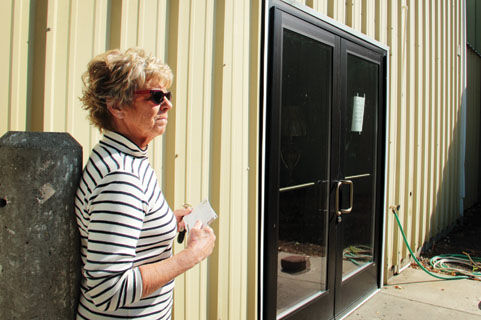Mary Jane awaits license to sell
August 22, 2014
The location is secured. The employees are hired. Pending approval from the state’s Liquor Control Board, Mary Jane Smith is ready to sell recreational marijuana.
“I’m on the last leg,” said Smith, who owns MJ’s Pot Shop on Bishop Boulevard in Pullman. “I sent everything in, and now it’s in their ballpark.”
The Liquor Control Board requires applicants to completely set up shop before it approves their licenses to confirm that everything they put on paper is accurate. Smith said she completed all the necessary paperwork and will be ready for a final inspection in two to three weeks.
“What it boils down to is they are making sure you aren’t selling it out of your garage,” she said.
The Liquor Control Board allotted for 334 marijuana retailer licenses across the state. So far, only 47 have been issued. Mikhail Carpenter, a representative for the Liquor Control Board, said shops whose licenses have not been issued aren’t necessarily behind the curve.
“There’s not a set timeline,” Carpenter said. “If you were to open any kind of business, everyone has their own way of hitting the benchmarks.”
Smith said she has no way of knowing when her license will be approved.
“We’re in the dark right now,” she said.
Two other marijuana retailers are expected to take up residence at 1340 S.E. Bishop Blvd., the former location of the tanning salon Tanfastic. However, Shelley Bennett, the commercial real estate broker who helped secure locations for the retailers, said Smith is the furthest along in the application process.
“There are just so many details to work out with the lease,” Bennett said.
Smith’s supplier is Buddy Boy Farm, a growing and processing operation outside Spokane that is licensed to grow a 21,000-square-foot plot of marijuana. Owner Steven Walser said Buddy Boy is one of few farms in the state already growing at full capacity.
“We provide for nine or 10 shops scattered around the state,” Walser said.
Smith said the taxes levied on producers, processors and retailers will make it difficult for her to compete with marijuana obtained illegally.
“You can go and buy a joint on the street for three bucks, but you go to the store and it’s 10 because of taxes,” she said. “The one nice thing is if you buy (my product) it will be consistent, and there won’t be any additives in it. You know exactly what you are getting.”
Walser added, “People can have some confidence as to what has been done to what they are smoking or ingesting,” noting that the Liquor Control Board requires all marijuana to undergo testing before it can be sold legally.
In Pullman, samples will be tested in a lab run by CannaSafe Analytics, a California-based company that also tests medicinal marijuana. Aaron Stancik, the lab’s scientific director, said CannaSafe recently filled the lab with $125,000 in testing equipment.
Before he started growing marijuana, Walser was a certified organic farmer. He said although cannabis can’t be certified as organic, he uses the same organic strategies he learned growing other crops.
“Some people use systemic pesticides,” Walser said. “For us, we aren’t going there. Our ideal is to be as low impact as possible.”
Although Smith is deeply invested in the marijuana industry now, at the beginning she didn’t take it seriously.
“It was all a joke,” Smith said. “It started out as a joke because my name is Mary Jane. Kids in high school know more about it than I do.”
Patrons must be at least 21 years old to purchase recreational marijuana in the state of Washington.





















